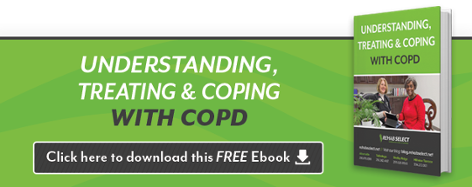 Are the symptoms of COPD making simple daily activities a struggle for you? While there is no cure for the disease, and the best help for COPD will come from treatment and medications prescribed by your health care team – and, of course, avoiding tobacco smoke – there are a number of other things you can do to help manage your symptoms more effectively.
Are the symptoms of COPD making simple daily activities a struggle for you? While there is no cure for the disease, and the best help for COPD will come from treatment and medications prescribed by your health care team – and, of course, avoiding tobacco smoke – there are a number of other things you can do to help manage your symptoms more effectively.
-
Breathing exercises – Learning to control your breathing through breathing exercises can make a big difference in your day-to-day life. Techniques like pursed lip breathing can help you gain control when you are gasping for air, slowing your breathing to allow more efficient movement of air into and out of your lungs. Techniques like diaphragmatic breathing, or belly breathing, can help strengthen your breathing muscles, making everyday breathing less of a chore. Ask your doctor for a referral to a pulmonary therapist or pulmonary rehab program for lessons in using these techniques and others to better manage your symptoms.
-
Learn relaxation techniques – Episodes of breathlessness often trigger a stress response in the body. That stress response typically makes breathing even more difficult. Learning to control the feelings of anxiety and panic caused by that stress response can put a halt to the vicious cycle, and relaxation techniques can be very effective in helping you gain that control. Many pulmonary therapists and rehab programs offer instruction in relaxation techniques, or you can engage a counselor or instructor on your own.
-
Keep dust down – Keeping your environment free of dust, dirt and pet hair can reduce airway irritation, reducing wheezing and coughing. However, if you will be doing the dusting yourself, wear a filtering mask to protect yourself while you're stirring things up.
-
Use gentler cleaning products – Harsh cleansers, such as bleach or strong disinfectants, can irritate your bronchial passages and lungs. Using mild, natural household cleaners can offer help for COPD sufferers in terms of minimizing everyday symptoms.
-
Avoid exposure to pollution and fumes – Keep an eye on the air quality reports and stay inside when pollution is high. Avoid backyard barbecues, indoor fireplaces and wood burning stoves. Leave painting to someone else, and stay out of the house when painting is being done to avoid the irritating fumes. Ask loved ones and co-workers to limit use of strong perfumes or air fresheners.
-
Eat differently – Digestion consumes both energy and oxygen, so eating a big meal can make you weak and tired. Also, a very full stomach can restrict movement of the diaphragm, making you work harder to breathe. You can reduce these reactions and your symptoms by eating 4 to 6 small meals per day instead of 3 large ones.
-
Exercise – While exercise may not seem like a smart move when you are feeling out of breath, a well-crafted exercise plan can actually help your body use oxygen more efficiently. Talk to your doctor about fitness plans, or see a physical therapist with experience with fitness help for COPD patients.
The bottom line is that minimizing COPD symptoms means taking good care of yourself and being aware of your environment, keeping it as free as possible of irritants that can trigger episodes of wheezing, coughing and breathlessness. By taking such measures, seeing your doctor regularly and being careful to follow your treatment plan carefully, you can learn to manage your symptoms and improve your quality of life.





